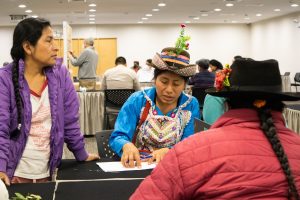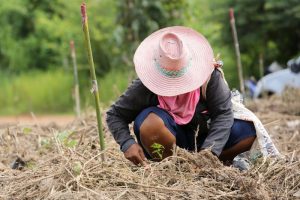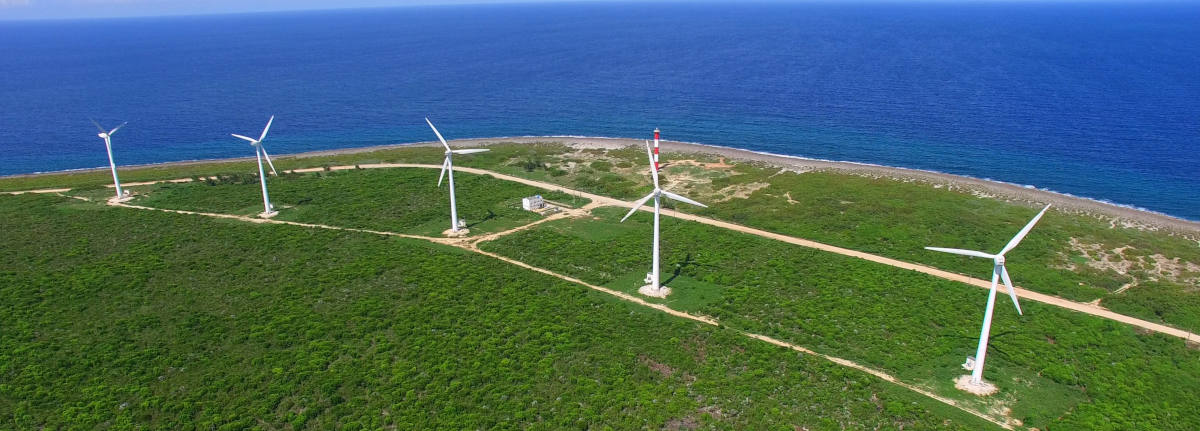-
|
05 June 2022
|Posteado en : Interview
Indigenous peoples occupy 22% of the world's territory and their role is essential for the maintenance of cultural diversity and biodiversity, according to UNESCO.
The nature managed by these communities is declining less rapidly than in other areas, as they work to protect the environment over the long term through sustainable use of biodiversity management and governance. However, they are the most affected by the effects of climate change.
The lands they manage account for 28% of the carbon stored in forests globally. Annually, they sequester an amount of CO2 equivalent, on average, to 30% of Brazil, Colombia, Mexico and Peru’s 2030 targets. These countries store 28% of the world’s carbon, but account for only 5.1% of global greenhouse gas emissions.
The latest report of the Intergovernmental Panel on Climate Change (IPCC) warns of the loss of ecosystems and the decrease in food production and access to food, which has led to an increase in malnutrition and has seriously affected the economy of these indigenous communities.
Climate policies have traditionally ignored the ancestral knowledge and wisdom of indigenous peoples, which is why 141 governments committed at COP26 in Glasgow to recognise the rights of these communities and their lands as a fundamental element in ending deforestation by 2030. Now Peru is launching an Indigenous Peoples’ Platform to address climate change.

It thus becomes a pioneer country in the recognition of indigenous knowledge and practices that contribute to the comprehensive management of climate change, as established in the Paris Agreement.
FIIAPP supports this Platform
We spoke with Teresa Aguilar and Álvaro Ovejas, Project Technicians in the European programme Euroclima+, co-led by the FIIAPP, which has supported the formation of this Platform. They tell us about the challenges in the implementation of this proposal and the great benefits it brings. This is the first time that the Peruvian Ministries of Culture and Environment have come together with the country’s indigenous peoples.
How was the Platform of Indigenous Peoples of Peru born to confront climate change?
Teresa: This Platform was born out of the indigenous people’s own demand and brings together the seven registered and legalised indigenous organisations in the country. It is a milestone on the Latin American continent because it brings together indigenous peoples of different casuistry, ethnicities and origins.

Álvaro: The Platform gives indigenous peoples a voice in climate governance bodies, such as the National Commission. In addition, Peru is a ratifier of ILO Convention 169, which establishes the obligation to consult indigenous peoples in all political and legal measures that could directly affect them.
What have been the main challenges in setting up this platform?
Teresa: The first challenge has been linguistic. The different indigenous peoples cannot understand each other, because not everyone speaks Spanish, only the political leaders. They speak five native languages such as Quechua, Aymara, Shipibo and Awajún. We have also faced the territorial challenge. It is not easy to move around in a country like Peru, and these are people who do not have access to digitalisation either.
How does climate change affect indigenous women the most?
Teresa: The indigenous population, because of their origin, is a rural population and their livelihoods depend on natural resources. Therefore, climate change directly affects their economic activity.
The impact of climate change is aggravated and is more disproportionate for women, who are already discriminated against and vulnerable. They are socially responsible for food and household health and, living in rural environments, their livelihoods are based on fishing, livestock, agriculture or agroforestry management. The impact of climate change degrades their economy, and we are already seeing climate migration in the face of environmental disasters caused by climate change.
What has been the role of the European programme Euroclima and the FIIAPP in the construction of the Platform?
Álvaro: Euroclima has been involved from the beginning of this process. It started with the prior consultation with indigenous peoples on the Framework Law on Climate Change, which agreed, among other provisions, on the creation of this Platform. It was during the development of the Framework Law on Climate Change that direct collaboration between Euroclima and the Peruvian Ministry of Environment began.
On the one hand, we have supported the development of dialogues between the Peruvian Ministry of Environment and national organisations. And on the other hand, we have supported the process of creating the entire legal, regulatory and institutional framework that gives the Platform its place.
Why are indigenous peoples known as guardians of diversity?
Álvaro: The way of life of indigenous peoples is not only very rural, but does not require the same infrastructure that is used in cities. Their routine is much more adapted to the environment.
Teresa: I think that the guardians of nature are undoubtedly the people who have originally grown up and lived in it. It is their ecosystem and they know it perfectly, it is what is called ancestral knowledge.
Is this initiative in Peru a reference for other Latin American countries?
Teresa: Peru is now a country that others look up to. There are countries that could replicate it because the Peruvian experience is scalable. All of Latin America has an indigenous population, but political will is needed. It all depends on the nature of the country and how this indigenous figure is received by governments.
There is also talk of indigenous associations at the regional level, such as those in the Amazon. The Amazon Basin has great value in terms of forests and the environment; it is the lungs of the planet and touches several countries. Therefore, we are no longer talking about a national platform, but a transnational one. When you talk to regional indigenous associations, their dream is to have a platform that unites them at the regional level.
-
|
05 March 2021
|Posteado en : Reportage
After decades of energy inefficiency, technological innovations have led to some enormous improvements in the responsible use of energy. However, the pressing need to curb climate change requires more efforts in this area.
Energy efficiency means optimising the use of resources to produce energy. As well as consuming fewer resources, it means reducing emissions. This is essential to gradual decarbonisation and to keep the increase in the planet’s temperature to a maximum of 1.5ºC. Companies and individuals have become more acutely aware of the finite nature of fossil fuels, their increasing cost and their environmental impact.
The international community made a global commitment in the 2015 Paris Agreement and the 2030 Agenda. The goal for 2030 is to ensure that everybody has access to electricity and to increase energy efficiency and the use of renewable sources of energy.
This general objective is specified in two of the 17 Sustainable Development Goals (SDGs). Among the aims of SDG7 “Affordable and clean energy” is to double the global rate of improvement in energy efficiency from 2015 to 2030. As the UN Energy Progress Report points out, although things are improving, there is still much to be done. SDG11 “Sustainable cities and communities” also warns of the concentration of the population in cities and the need to develop adequate, energy efficient urban infrastructures.

To this end, in 2012 the European Union enacted a series of binding measures to promote energy efficiency with Directive 2012/27 / EU. In 2020, under the European Green Deal, the European Union committed to a more demanding objective of improving energy efficiency from 20% to 32.5% compared to 1990 levels.
With the 2030 Agenda and with European and Spanish cooperation as its point of reference, FIIAPP has been working on cooperation projects with public administrations around the world for more than 20 years. With the maxim of benefiting citizens, several of the projects implemented by the Foundation have included the promotion of public policies to foster energy efficiency among their objectives.
For example, under the EUROCLIMA + cooperation programme, we are currently working in collaboration with Paraguay to promote clean technologies and energy efficiency. As part of the “Promotion of the Efficient Use of Biomass in Paraguay” action, the Vice Ministry of Mines and Energy and the Ministry of Environment and Sustainable Development (MADES) are receiving support to develop a calculation tool for SMEs to carry out self-diagnosis of energy consumption and identify potential savings points.
In the field of Public Technical Cooperation, the team is working to design and run a national dissemination campaign targeting the agro-industrial sector. The purpose of this campaign is to instil the concept of energy efficiency and its benefits in economic, social and environmental aspects in the productive sector.
FIIAPP also works closely on energy efficiency matters with Cuban public bodies. Cuba has launched a new roadmap for the country to gradually incorporate renewable energy sources and work on energy efficiency. The aim is that by 2030 at least 24% of the energy generated will be renewable with better efficiency. This would mean saving 1.73 million tons of fuel per year and avoid releasing 6 million tons of CO2 emissions into the atmosphere.
One of the actions of the Cuba-EU II Expert Exchange programme aims to improve energy efficiency in the Cuban hospitality sector. Three specialists from the Refrigeration and Air Conditioning Institute (IRC) are taking part in a Master’s Degree in Energy Conversion Systems and Technologies, at the Rovira y Virgilio University in Tarragona.
Alexander Maura is working on his thesis on solar energy-based conversion systems in a hotel in an isolated area that generates its own electricity using fossil fuels, Ricardo Domínguez’s thesis explores the use of biogas for refrigeration and air conditioning purposes of a pig farm while Carlos Luis Izquierdo is designing a grid-connected photovoltaic system at IRC to boost renewable energy and reduce emissions.

‘Cuba Renovables’ is another of the projects managed by FIIAPP to promote energy efficiency among Cuban institutions. The project is part of the “Cuba Energy Support Programme”, implemented through a programme of cooperation between the EU and Cuba. Its aim is to contribute to the effective implementation of the ‘Policy for the prospective development of renewable energy sources and energy efficiency’ in Cuba and its regulatory framework.
The project supports the new national policy promote rational use of energy by reducing consumption and increasing savings. Cuban institutions have already launched different awareness campaigns for the population. Companies also play an important role and work is being done to promote the production of equipment for private and industrial use that is more efficient in saving energy.
These projects are an example of the effort of the international community, the European Union and Spain to offer joint responses through cooperation to global problems such as climate change. With the 2030 Agenda, the SDGs and the European Development Consensus as a guide, FIIAPP encourages public institutions to share their experience, steering them to generate results, forge relationships of trust and strengthen values in societies.
-
|
06 February 2020
|Posteado en : Interview
We interview Cătălin Harnagea, director of RoAid, the Romanian development cooperation agency
RoAid is Romania’s international development cooperation agency, which combines the work of Romanian public institutions, civil society and the private sector, to foster global efforts to sustainably alleviate extreme poverty and support stronger democratic institutions in developing countries.
Romania, which joined the EU in 2007, also became an official development assistance donor (ODA) the same year. This was when the country joined the efforts by the international community to support the economic, social and political welfare of developing countries.
Cătălin Harnagea is the director of RoAid and we had the opportunity to ask him about the newly created agency.
Let’s talk about RoAid.
Ours is a very young agency. We have been working for a little over a year and a half, since spring 2018. We have now carried out some missions and started projects; and in addition to our agency’s goals with our partner countries, we also want to raise the profile of our work in the European Union, for example through our recent access to the Practitioner’s Network.
How was the agency set up and how has it evolved during this time?
Until two years ago, we had a special unit within the Romanian Ministry of Foreign Affairs, whose function was to develop policies and establish development cooperation priorities in Romania. Now, in collaboration with this Ministry and with other institutions, as well as formulating policies and priorities, we also implement these policies through our projects.
What can you tell us about the projects you are now managing?
Our projects are based on Romanian foreign policy priorities, which have very important objectives in the countries and regions around Romania, including the Black Sea region and the Western Balkans. In addition, there are specific opportunities and projects in Moldova, in Ukraine, and in Georgia. Also, in 2020 we hope to start working in Armenia, Serbia, Albania, Bosnia Herzegovina and other countries in the region.
I would also like to point out that our thematic priorities are 100% based on the Sustainable Development Goals of the 2030 Agenda and, with this support, we are developing and implementing some projects in Africa, such as in the Congo in the field of energy, as well as others in Zambia, Tanzania, Malawi and Zimbabwe. In fact, we going to sign a trilateral agreement between the Romanian Ministry of Foreign Affairs and the African Union.
We have also prioritised contact with other agencies such as KOICA, a Korean cooperation agency with which we have signed a memorandum of understanding and we have relationships with other agencies such as the Japanese JICA and, of course, European agencies such as those in Austria, the Czech Republic, and Spanish agencies, such as FIIAPP.
How do you rate your entry into the Practitioner’s Network, the network of European cooperation agencies?
We believe that it is a fundamental pillar to consolidate the implementation of development cooperation projects and, for us, this entry is very important because we want to understand what our strategic objectives are and which of these they consider to be the most important in the long, medium and short term.






